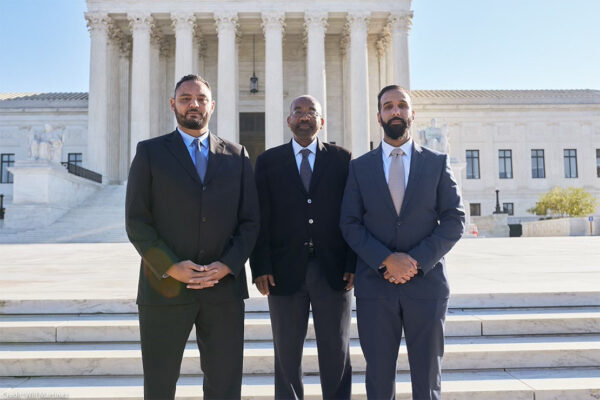Supreme Court Allows Suit Against F.B.I. for Spying on Muslims to Move Forward
Narrow Decision Allows Government to Assert State Secrets Privilege Despite Safeguards Established by Congress in the Foreign Intelligence Surveillance Act
WASHINGTON ÔÇö In a challenge to the FBIÔÇÖs discriminatory surveillance of three Muslim American men, the U.S. Supreme Court today that the government may assert the state secrets privilege in cases alleging that it engaged in unlawful surveillance.
However, the court took pains to leave open whether the state secrets privilege allows courts to throw out cases alleging unlawful surveillance simply because the government invokes national security. The case will now go back to the Ninth Circuit Court of Appeals to address that question.
ÔÇ£The Supreme Court today refused the governmentÔÇÖs invitation to extinguish our clients' religious discrimination claims simply because the government invokes ÔÇÿstate secrets,ÔÇÖÔÇØ said Peter Bibring, senior counsel with └¤░─├┼┐¬¢▒¢ß╣¹ of Southern California. ÔÇ£The decision allows our clients to continue to fight in lower courts for their right to hold the FBI accountable for its discriminatory surveillance of Muslim Americans.ÔÇØ
The case stems from an FBI operation in 2006 and 2007 in which agents sent a paid informant to some of the largest, most diverse mosques in Orange County, California and instructed him to pose as a convert to Islam.
The FBI informant indiscriminately gathered names, telephone numbers, and email addresses, as well as information on the religious and political beliefs of hundreds of Muslim Americans who were exercising their constitutional right to religious freedom. Community members became increasingly concerned about the informantÔÇÖs behavior, and ultimately reported him to the FBI.
After the plaintiffs ÔÇö Sheik Yassir Fazaga and community members Ali Malik and Yasser AbdelRahim ÔÇö filed suit, the district court held that it could not consider claims that the FBI unlawfully targeted Muslim community members for surveillance because the FBI argued that further proceedings could disclose ÔÇ£state secrets.ÔÇØ The court of appeals disagreed, instructing the district court to consider the plaintiffsÔÇÖ religious discrimination and surveillance claims under procedures mandated by Congress in the Foreign Intelligence Surveillance Act (FISA), which specifies how courts should handle sensitive evidence in cases involving surveillance conducted for national security purposes.
The Supreme CourtÔÇÖs ruling today held that Congress did not displace the state secrets privilege when it enacted FISA, leaving the government free to invoke the privilege to withhold surveillance evidence from courts altogether, rather than submitting that evidence for courts to review behind closed doors.
ÔÇ£The Supreme CourtÔÇÖs ruling is a dangerous sign for religious freedom and government accountability in spying cases,ÔÇØ said Patrick Toomey, senior staff attorney with the └¤░─├┼┐¬¢▒¢ß╣¹ÔÇÖs National Security Project. ÔÇ£Decades ago, Congress established protections for people challenging abusive spying in court, but todayÔÇÖs decision puts a critical safeguard out of reach. Though it is not the end of the road, the ruling makes it harder for those who have had their rights and privacy violated by discriminatory surveillance in the two decades since 9/11 to prove their claims in court.ÔÇØ
Plaintiffs in the case are represented by the └¤░─├┼┐¬¢▒¢ß╣¹, the └¤░─├┼┐¬¢▒¢ß╣¹ of Southern California, the UCLA Center for Immigration Law and Policy, the Council on American-Islamic Relations California, and the law firm of Hadsell Stormer Renick & Dai LLP. FBI v. Fazaga is part of the └¤░─├┼┐¬¢▒¢ß╣¹ÔÇÖs Joan and Irwin Jacobs Supreme Court Docket.


